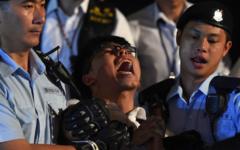A court in Hong Kong delivered sentences on Tuesday for some of the city's most recognized pro-democracy activists, including Joshua Wong and Benny Tai, as part of a highly contentious national security trial. Known collectively as the "Hong Kong 47," these individuals were charged three years ago during a broader crackdown that followed the implementation of China's National Security Law (NSL). While two defendants were acquitted earlier this year, the court sentenced the remaining 45 individuals, comprising eight women and 39 men, to varying prison terms.
The charged activists were accused of attempting to overthrow the government through an unofficial primary conducted in July 2020, aimed at selecting opposition candidates for the Legislative Council (LegCo) elections. The event attracted over half a million participants and sought to ensure that opposition voices could effectively challenge the pro-Beijing administration. However, Hong Kong and Beijing officials expressed concerns that the primary could contravene the NSL, introduced just days prior to the event.
Organizers contended that their actions fell within the rights guaranteed by Hong Kong's Basic Law, which was intended to uphold civil liberties. Ultimately, the judicial ruling favored the prosecution, affirming that the primary could have led to a constitutional crisis if the opposition candidates gained legislative power.
Among the defendants were renowned figures such as Wong and Tai, who emerged as prominent leaders of the democracy movement, notably during the 2014 Umbrella Movement. Other noteworthy activists included Claudia Mo, Helena Wong, and Leung Kwok-hung, also known as "Long Hair," each with their unique contributions to the pro-democracy landscape.
Many accused activists, including new-generation voices like Owen Chow, Ventus Lau, and Tiffany Yuen, actively took part in protests that resonated with the public following the 2019 anti-extradition law demonstrations. Even individuals not typically associated with politics became involved, demonstrating the widespread societal engagement with the pro-democracy movement.
Pre-trial detentions have become commonplace under the NSL, with most activists arrested in early 2021 remaining incarcerated until the trial. Some, including Tai and Wong, have faced prior convictions and sentences under different charges related to their protest activities. Wong, for instance, was sentenced to four years and eight months for his involvement in protests dating back to 2019.
The court's decisions have amplified concerns regarding civil rights and freedoms in Hong Kong, especially as critics warn that these drastic measures represent an effort by the Chinese government to silence dissent and stifle the pro-democracy movement altogether. The ramifications of this trial extend beyond the individuals sentenced, casting a long shadow over the political landscape of Hong Kong and its future.





















